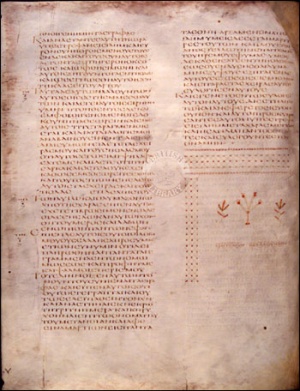Difference between revisions of "Template:Featuredcontent"
Jump to navigation
Jump to search
Graham grove (talk | contribs) m |
Graham grove (talk | contribs) |
||
| Line 1: | Line 1: | ||
[[Image:Codex Alexandrinus Luke.jpg|thumb|A copy of the [[Codex Alexandrinus]] opened to the [[Gospel of Luke]].]] | [[Image:Codex Alexandrinus Luke.jpg|thumb|A copy of the [[Codex Alexandrinus]] opened to the [[Gospel of Luke]].]] | ||
| − | <h3>'''[[Koine Greek]]'''</h3> | + | <h3>'''[[Koine Greek#Main Article|Koine Greek]]'''</h3> |
Koine is the Greek word for "common." [[Koine Greek]] (also called New Testament Greek) was the form of the Greek language used from around 300 BC to AD 300. The books of the [[New Testament]] were originally written in Koine Greek. Koine Greek was the lingua franca (or the commonly used language of communication) in the Mediterranean and Middle Eastern for hundreds of years following the conquests of Alexander the Great, including during the time of the early church. | Koine is the Greek word for "common." [[Koine Greek]] (also called New Testament Greek) was the form of the Greek language used from around 300 BC to AD 300. The books of the [[New Testament]] were originally written in Koine Greek. Koine Greek was the lingua franca (or the commonly used language of communication) in the Mediterranean and Middle Eastern for hundreds of years following the conquests of Alexander the Great, including during the time of the early church. | ||
{{rightbox | text=[[Archives of Featured Content]]}} | {{rightbox | text=[[Archives of Featured Content]]}} | ||
Revision as of 11:49, 12 September 2007
Koine Greek
Koine is the Greek word for "common." Koine Greek (also called New Testament Greek) was the form of the Greek language used from around 300 BC to AD 300. The books of the New Testament were originally written in Koine Greek. Koine Greek was the lingua franca (or the commonly used language of communication) in the Mediterranean and Middle Eastern for hundreds of years following the conquests of Alexander the Great, including during the time of the early church.
| Archives of Featured Content |
